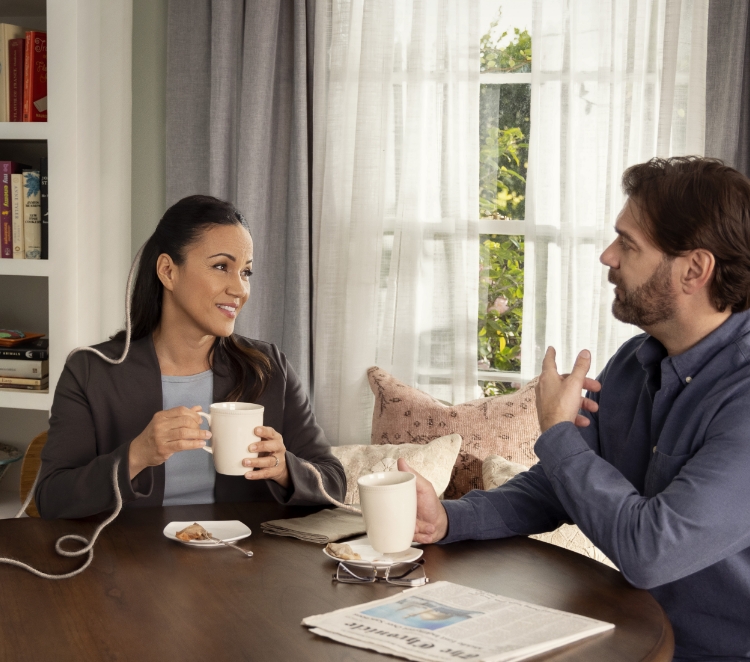
Actor portrayals
The right support could make a real difference to a loved one struggling with uncontrollable body movements
You may not have tardive dyskinesia (TD), but you might know someone who does.
Caring for someone with TD can be challenging. It may be up to you to help identify symptoms and assist in managing their condition.
Sometimes people with TD may not realize they are having uncontrollable body movements or they may not be ready to talk about it. However, with your positive influence, you can help create on-going conversations.
Care Partner Support Tips
Care Partner Support Tips
some things to discuss include:
Know what TD looks like and how to recognize it
Mild, moderate, or severe uncontrollable body movements can occur in one or more spots in the body. They are often seen in the face, torso, limbs, and fingers or toes.
Educate yourself on the cause and impact of TD
TD is associated with taking certain mental health medicines (antipsychotics) to treat conditions like depression, bipolar disorder, schizophrenia, or schizoaffective disorder. TD can develop after a few months or years of treatment on mental health medicines.
Encourage them to talk to their healthcare provider
If you think someone in your life may have TD, ask them if they would consider talking to their healthcare provider about TD or related movement disorders.
Keep an eye out for signs and symptoms of TD
If someone you know is experiencing uncontrollable body movements, they may not be aware of these movements. You can help them learn to recognize the condition and get the help they need to manage their TD.
Get more TD information and tips
SIGN UP FOR INFOIt’s OK to speak up—if you think someone you care about may have uncontrollable body movements, encourage them to talk to their healthcare provider about TD. Also, consider asking them to record their movements so they can share them with their provider during an in-person or telemedicine appointment.

Actor portrayals
Actor portrayals
Care partners need support, too
It can be challenging for everyone involved when someone is diagnosed with TD.
Research shows that care partners often neglect their own health due to the challenge of caring for others. Make sure you’re taking care of yourself as it can help you take care of others.
Activities that may help relieve stress:
- Getting plenty of sleep every night
- Maintaining a balanced, nutritious diet
- Exercising regularly
Get information about TD.
Learn more about TD and how to start a conversation with your loved one's healthcare provider about TD diagnosis and treatment.
Sign up for infoGet TD Support
Discover helpful resources, including organizations that support TD and mental health. Many advocacy groups have specific resources for care partners.
View resources
Within the last year, the Doctor Discussion Guide has been downloaded over 115,000 times,* helping many have meaningful discussions with their doctor.
*Source: Google Analytics 4, January 1, 2025–August 31, 2025.

Talking to a HEALTHCARE PROVIDER is the first step in helping your loved one manage uncontrollable body movements.
Help may be closer than you think. More than 25,000 neurologists, psychiatrists, and advanced-practice healthcare providers who have experience with diagnosing and treating TD are available.† Use the Find a Specialist tool to take your first step.
†Data on file; 08/2025. Neurocrine Biosciences, Inc.
